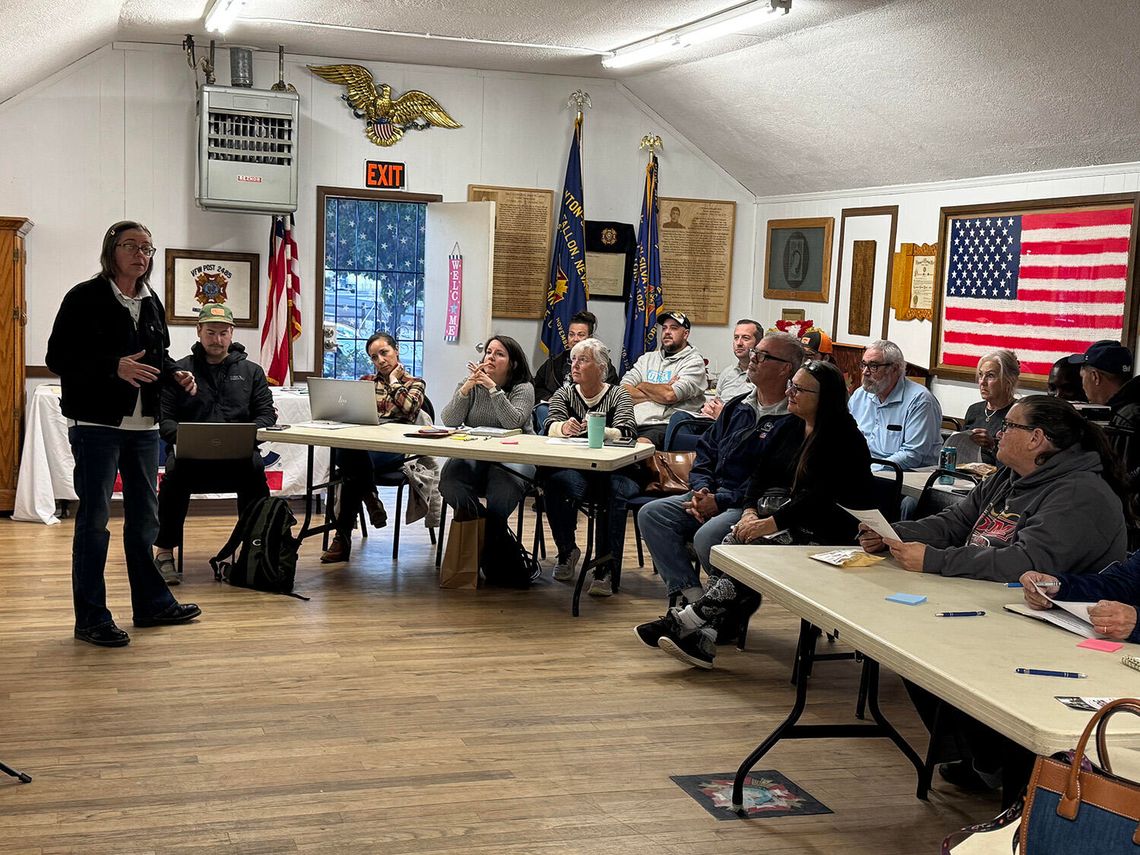When it comes to cottage food, homemade cosmetics, craft fermentation, and mobile meat processing, producers in Fallon and surrounding communities are ready for clarity.
At a standing-room-only meeting hosted at the VFW Hall last week, Kelli Kelly, food systems business advisor with the Nevada Small Business Development Center, led a detailed presentation on recent legislative changes that will reshape how Nevada regulates home-based food and cosmetic businesses.
“This isn’t a class, I’m not taking attendance,” Kelly told the crowd as she kicked off the session. “We’re here to listen to you. We want to hear what’s working, what’s not, and what you need as these rules are written.”
Kelly was joined by Doug Busselman, Executive Vice President of the Nevada Farm Bureau, as well as Staci Emm and Andrew Waaswa from UNR Extension, all part of a coalition working with the Nevada Department of Agriculture (NDA) as it assumes regulatory authority for cottage food, craft food, and inspected food establishments.
The packed room represented a cross-section of Nevada’s local food economy from bakers, soap makers, livestock producers, herbalists, and farmers from as far as Virginia City and Yerington, each curious how the new rules would affect their businesses.
One of the most significant changes comes from Senate Bill 466, which transfers oversight of food establishment laws (Chapter 446 of the Nevada Revised Statutes) from the Department of Health and Human Services to the Nevada Department of Agriculture.
In practical terms, Kelly explained, that means environmental health specialists, many of whom currently work for county or regional health districts, will now operate under NDA.
“For areas like Churchill County that already have a local health district, you’ll keep the same inspectors and relationships you have now,” Kelly said. “The difference is administrative; their contract will shift from Health and Human Services to Agriculture.”
For rural counties without a local health department, such as Lyon and Storey, inspections and licensing will now be handled directly by NDA staff. Kelly said the state expects to streamline permitting with online applications and standardized forms to replace the county-by-county patchwork that’s frustrated many home producers.
One Lyon County baker shared her story of spending a month calling between counties before finally driving to Elko to get her cottage license. “I shouldn’t have to drive four hours to do that,” she said, drawing nods around the room.
Kelly outlined the key reforms passed in Assembly Bill 352, the sweeping “Cottage Food Reform Bill,” carried by Assemblywoman Natha Anderson. The bill modernizes how small food and cosmetic producers operate in Nevada:
- Cottage Food sales cap increases from $35,000 to $100,000 per year.
- Expanded sales options: Producers will be able to sell through email, online, or third-party delivery within Nevada, not just face-to-face “whites of the eyes” transactions.
- Still direct-to-consumer: Cottage products cannot be sold for resale to coffee shops or stores.
- Cottage Cosmetics Program: New legal framework allowing small producers (under $100,000 in sales) to make and sell non-hazardous skin and body products such as lotions, soaps, and scrubs.
- Craft Foods: Expanded to include naturally fermented products, such as hot sauces or sauerkraut, with testing and ServSafe requirements.
- Mobile Meat Processing: Creates a path for state-inspected mobile units that can process meat for resale directly on-farm.
The new programs are slated for full implementation by July 1, 2027, though Kelly said the coalition hopes to accelerate that timeline by working closely with NDA.
Although the shift to the Department of Agriculture marks a major administrative change, local health departments will continue to play a central role in inspections, particularly for food establishments and shared commercial kitchens.
“Your local health inspectors aren’t going away,” Kelly emphasized. “If you already have a good relationship with your inspector, keep it, they’ll just be working under a new agency contract.”
For small rural counties, NDA will take the lead directly. “The goal is to make it easier, not harder,” Kelly said. “We’ve heard you loud and clear that the current patchwork system isn’t working.”
After the presentation, the discussion turned into a brainstorming session. Entrepreneurs called for clearer ingredient rules, flexibility for seasonal recipes, permission to offer product samples, and a more streamlined process for fermented foods and dairy-based baked goods.
Kelly encouraged everyone to join the coalition’s mailing list to stay informed as the Nevada Department of Agriculture drafts new administrative codes. Future listening sessions are planned across the state and online.
“This is how the sausage gets made—literally and figuratively,” Kelly joked, drawing laughter. “Your feedback will help shape how these programs work for years to come.”
Producers can find summaries, handouts, and the full text of the new laws on the Nevada Small Business Development Center’s website or sign up for updates from UNR Extension and the Nevada Department of Agriculture.
Virtual listening session hosted by UNR Extension Office, Oct. 21. More information is available at extension.unr.edu









Comment
Comments